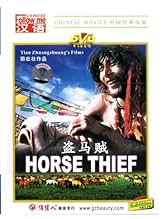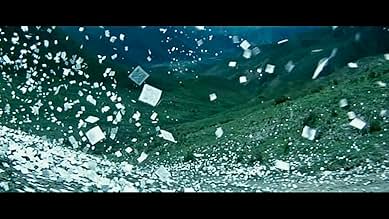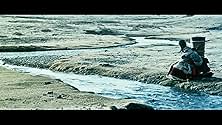AVALIAÇÃO DA IMDb
6,8/10
1,6 mil
SUA AVALIAÇÃO
Adicionar um enredo no seu idiomaA Tibetan man struggles to provide for his family.A Tibetan man struggles to provide for his family.A Tibetan man struggles to provide for his family.
- Prêmios
- 1 vitória no total
Avaliação em destaque
This is a movie about human beings living in the stark and pitiless land of Tibet. Tibetans have a clear if not too numerous a presence in North India and I always felt deeply curious about these strangers from a land not too distant yet strange and mysterious. My first memories of these people are of tattered nomads moving in groups. Today they are educated, vocal and have prospered economically on Indian soil.The present film is like a response to an inborn craving to visit this land.
It is set in 1923, thus steering clear of political controversies in China, of which Tibet is now a part. Tibet is the highest plateau in the world, with an average altitude of 16,000 feet. Going by this film, it also seems the most wind blown place. The mists are always floating swiftly away and the pennants planted near temples fluttering noisily like an array of weathercocks. I cannot remember any movie with such splendor of cinematography, not even David Lean at his best. It is a world of transcendent beauty. There is nothing of the picture postcard tailor's dummy prettiness. The azure mountains, snow deserts and water bodies live and breathe as though with the presence of stern deities. The musical score , comprising natural sounds, muffled incantations and a continuous drone punctuated with funereal beats of percussion unspoken script or reverent commentary on this extra terrestrial world.
Norbu is a poor member of a nomadic tribe. He has a wife and small boy to support. Though devout he is forced into stealing horses for survival. He is expelled from his group under sentence of amputation if he should return. The film follows his journey through different regions in the course of which he loses his son to disease and sires another one. Religion and ceremonies dominate the life of these simple minded and plainspoken folk. Probably they need this belief as a necessity in their lives with death and starvation constantly dangling over them. Norbu is a god fearing person and it is only to save his offspring from the jaws of starvation that he is driven to stealing. He contributes a good part of his "earnings" to the temple.
Both the mood and the score is reminiscent of Tarkovsky's Stalker. These snow blown mountains and deserts are also inhabited by a mysterious presence hinting at realities other than the familiar. The word mesmeric applied to this film is not a cliché but an accurate description of it's power.
At the end of the day, people are the same--in Tibet, Calcutta or in the US.
It is set in 1923, thus steering clear of political controversies in China, of which Tibet is now a part. Tibet is the highest plateau in the world, with an average altitude of 16,000 feet. Going by this film, it also seems the most wind blown place. The mists are always floating swiftly away and the pennants planted near temples fluttering noisily like an array of weathercocks. I cannot remember any movie with such splendor of cinematography, not even David Lean at his best. It is a world of transcendent beauty. There is nothing of the picture postcard tailor's dummy prettiness. The azure mountains, snow deserts and water bodies live and breathe as though with the presence of stern deities. The musical score , comprising natural sounds, muffled incantations and a continuous drone punctuated with funereal beats of percussion unspoken script or reverent commentary on this extra terrestrial world.
Norbu is a poor member of a nomadic tribe. He has a wife and small boy to support. Though devout he is forced into stealing horses for survival. He is expelled from his group under sentence of amputation if he should return. The film follows his journey through different regions in the course of which he loses his son to disease and sires another one. Religion and ceremonies dominate the life of these simple minded and plainspoken folk. Probably they need this belief as a necessity in their lives with death and starvation constantly dangling over them. Norbu is a god fearing person and it is only to save his offspring from the jaws of starvation that he is driven to stealing. He contributes a good part of his "earnings" to the temple.
Both the mood and the score is reminiscent of Tarkovsky's Stalker. These snow blown mountains and deserts are also inhabited by a mysterious presence hinting at realities other than the familiar. The word mesmeric applied to this film is not a cliché but an accurate description of it's power.
At the end of the day, people are the same--in Tibet, Calcutta or in the US.
- smrana9377-831-371630
- 20 de dez. de 2010
- Link permanente
Enredo
Você sabia?
- CuriosidadesNumber 1 on Martin Scorsese's top 10 movies of the 90s list, which he presented on a special episode of At the Movies with Roger Ebert. Even though the movie was made and released in the 80s, it gain traction in the US during the 90s.
- ConexõesFeatured in Siskel & Ebert & the Movies: Best of the '90s (2000)
Principais escolhas
Faça login para avaliar e ver a lista de recomendações personalizadas
- How long is The Horse Thief?Fornecido pela Alexa
Detalhes
- Data de lançamento
- País de origem
- Central de atendimento oficial
- Idiomas
- Também conhecido como
- The Horse Thief
- Locações de filme
- Empresa de produção
- Consulte mais créditos da empresa na IMDbPro
Contribua para esta página
Sugerir uma alteração ou adicionar conteúdo ausente

Principal brecha
By what name was O Ladrão de Cavalos (1986) officially released in India in English?
Responda






